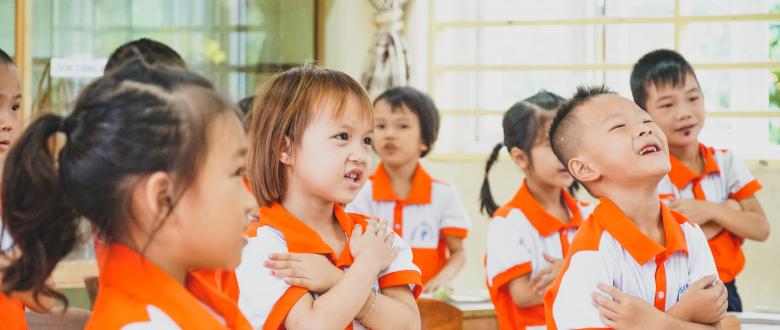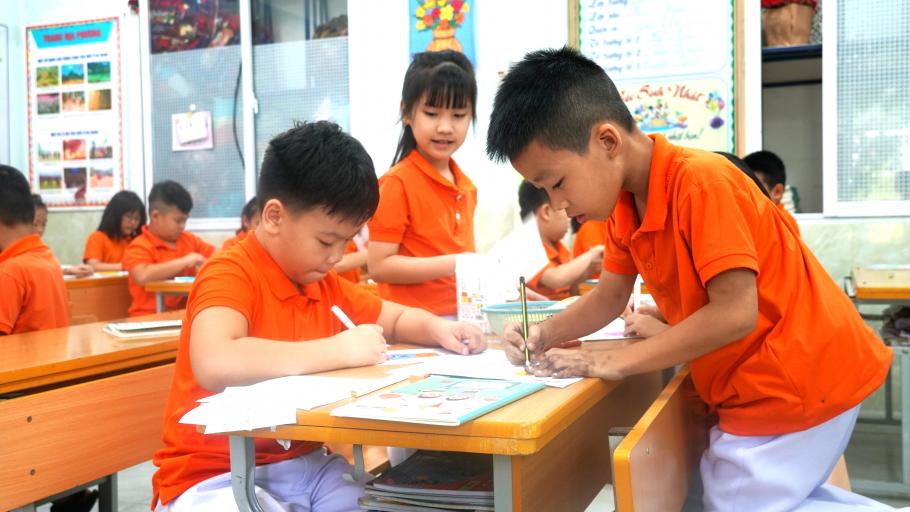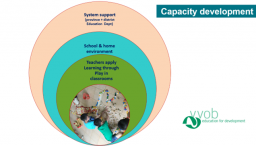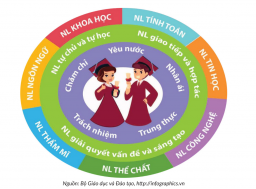
When Vietnam’s Ministry of Education and Training (MOET) shifted to a competency-based curriculum, VVOB was ready to help incorporate learning through play in primary classrooms across the country. Through the “Integrating Play-based Learning Activities among Young learners” (iPLAY) project – which is supported in part by the LEGO Foundation – VVOB has been working closely with the MOET and its provincial counterparts to embed playful pedagogies into the country’s new national model for teacher professional development.
Aligning to a New Education Model
In 2018, Vietnam’s Ministry of Education rolled out a competency-based education model, which expanded the country’s required curriculum significantly. According to UNESCO, a competency-based curriculum emphasizes not only what students are expected to know but also what they are expected to do. Competency-based curricula is designed to be learner-centered and adaptable to the shifting demands of students, teachers, and society. Students learn to apply the knowledge, skills, and attitudes necessary to address challenges and opportunities they encounter daily.
“Even with earlier changes in the economy due to industrialization, the nature of education in Vietnam [traditionally focused] on the academic outcome, which means that classroom practice [was] highly teacher-centered and knowledge-focused,” explains Huong Ha Thi Thu, Education Manager at VVOB Vietnam. “Society in Vietnam often believes that the education system should focus on the retention of knowledge, yet this [new] competency-based curriculum shifted the mindset to transform the knowledge-based education system into one that can comprehensively develop children’s qualities and capacities – both physical and mental. This required a fundamental shift away from teacher-centered practices to embrace integrated pedagogies that focus on knowledge application and skills to solve the problem for the students.”
To support the government’s transition in this process, VVOB Vietnam developed the iPLAY project to integrate Learning through Play in primary education. The context and timing of the Ministry of Education’s shift to a competency-based education model aligned well with the approach of Learning Through Play – both placing a strong emphasis on innovative educational methods that encourage students' initiative and activeness in learning. “The Ministry of Education and Training acknowledged that the iPLAY project came at the right time with the right tools alongside the competency-based program,” Huong said.
Integrating playful pedagogies into classrooms helps foster the competencies outlined in the country’s new education model. “Learning through Play can help teachers create a playful and accessible environment where students can have fun and learn better,” explains Chau Nguyen Bao, the iPLAY Project Coordinator for VVOB Vietnam. “This assists teachers to foster autonomy of the children, which is quite new [compared to] our traditional setting of Vietnam schools.”
According to VVOB, the iPLAY project identifies foundational educational content as well as key competencies that students must form, cultivate, and develop.
Playful classroom activities can foster students’ skills development. For example, "hopscotch on paper" is an activity designed by a teacher in the Ha Giang Province that fosters positivity in the classroom and allows students to practice creative problem-solving, communication, and other foundational skills. In this activity, children are learning multiples of eight. The teacher divides the class into four sub-groups of four students, letting them work on different math assignments together. First, the students roll a die to select 1 out of 4 math assignments. Next, they work together in groups to solve the math problem and color in an answer sheet decorated as a mushroom with multiple cells. This activity encourages students to have more social interaction while they engage in math activities. Students have room to hone their problem-solving and communication skills when they collaborate on this group activity. They can also learn new ways of doing math while exchanging the results with their peers.

Photo: Hopscotch on paper, a play-based activity designed by the teacher.
Through active participation, playful activities not only help children learn foundational academics, but they can also improve their social skills through interactions with other children. Play also enables teachers to form meaningful connections with their students as they collaborate to solve problems, try out new ideas, and discover new things. Teachers can foster a love of learning that will last a lifetime by stimulating curiosity and providing a variety of hands-on activities.
The VVOB team believes that teachers, school leaders, and duty bearers recognize the benefits of play and the critical role it plays in the lives of children and adolescents. “Learning through Play allows students to enjoy their lessons while also developing holistically,” adds Chau.
Partnering with Ministry of Education and Training
To train teachers to use these playful pedagogies and embed it into the system, VVOB Vietnam collaborated strategically with the Ministry of Education to provide teacher professional development training. This ministry partnership created an enabling environment for VVOB to work directly with the teachers and schools.
“Through training, we provided the teachers with the principles and techniques of applying learning through play in schools,” explains Huong.
Since August 2021, VVOB Vietnam has directly provided training to over 6,200 school managers, core teachers, and nearly 240 DOET and BOET officials in 8 target provinces on provinces on rough play and its benefits for teachers and students. This training – combining peer-to-peer learning, online self-paced modules for teachers and school leaders, coaching, and reflection and sharing– has provided teachers with the knowledge and skills needed to implement innovative pedagogies in the classroom. VVOB Vietnam has also been able to conduct 9 training for approximately 700 provincial education officials. Once school leaders and core teachers have completed VVOB’s learning through play courses, they organize school-based training for all fellow teachers which has resulted in over 200,000 teachers being trained.
What’s Next
VVOB’s iPLAY project is one of several country-specific initiatives funded by the LEGO Foundation’s Play Accelerator, which aims to systemically scale up the use of Learning through Play pedagogies in primary school classrooms through teacher professional development. Through this initiative, teachers are trained and supported to use integrated pedagogies.
In the coming months, to roll out Learning through Play at a national scale, VVOB has been developing the online learning course on learning through Play to allow access to more teachers who are not trained. This e-course on Learning through Play will equip more teachers in Vietnam with the necessary knowledge and techniques to apply innovative pedagogies in their classrooms. VVOB will also provide videos on examples of the Learning through Play application in lesson plans and classrooms.
Learn more about the iPLAY project here
This work is supported by the LEGO Foundation.
This article was written by Ruth Namara and Jamie Lonie from Unbounded Associates, and reviewed by Kate Anderson from Unbounded Associates, and Jamie Farschi from the LEGO Foundation. We’re grateful to VVOB Vietnam for their input and guidance.






